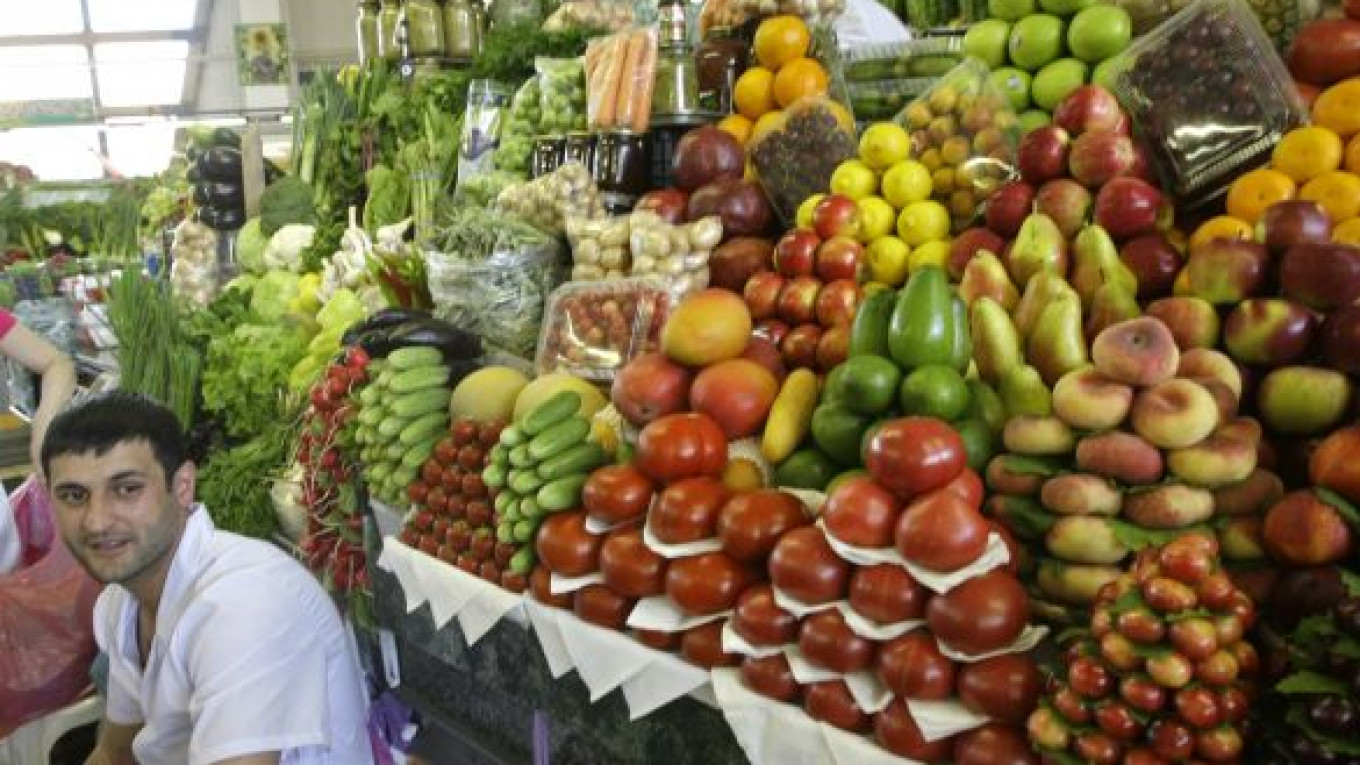Food prices, which have eased to help stabilize inflation, may rise in June and July as grain exports resume after last year's drought and the government bans vegetable imports from the European Union.
Inflation remained at 9.6 percent for a second month in May, equaling a 19-month high, the State Statistics Service said Monday. Prices rose 0.5 percent during the month after increasing 0.4 percent in April.
The annual rate stabilized as the effects of Russia's worst drought in 50 years abated, slowing annual food-price growth to 13.4 percent from 14.1 percent in April. While the Central Bank says its 6 percent to 7 percent inflation target is achievable this year, central bankers and analysts including ING Groep's Simon Quijano-Evans warn of threats over the next two months.
"The risks are clearly there, and the Central Bank knows it," Quijano-Evans, ING's chief economist for Europe, Middle East and Africa, said Monday from London. "We should still be able to end the year quite a bit below current levels."
The inflation situation "may turn around sharply" in early July, the month in which food prices began their ascent last year, Central Bank First Deputy Chairman Alexei Ulyukayev said in an interview with Vedomosti published Monday.
Food prices, which make up more than a third of the consumer-price basket, were unchanged from the previous month in May after growing 0.4 percent in April and 0.9 percent in March.
Prices for foods such as potatoes and buckwheat jumped in 2010 after record heat destroyed crops across the country. Russia's Black Earth area, which accounts for a fifth of the country's grain output, faces a "50-50" chance of drought this year if temperatures stay near 30 degrees Celsius for another three weeks, Black Earth Farming's chief financial officer Michael Shneyderman said Monday.
Lifting the ban on grain exports introduced in response to last year's shortages is the only "significant risk factor" for inflation, Central Bank Chairman Sergei Ignatyev said last week. The resumption of exports on July 1 may push domestic prices higher, Yulia Tseplyayeva, head of research at BNP Paribas in Moscow, said May 30.
Russia should consider temporarily introduce a floating duty on grain sales abroad to ease the possible inflationary effects of resumed exports, Ignatyev said June 1.
"The export duties could be adjusted monthly depending on the prices on global markets," Ignatyev said in an interview with RIA-Novosti posted on the Central Bank web site. The measure may be needed for a year and would be "similar" to duties used for oil and oil products, he told the state-run news service.
Russia's ban on imports of fresh vegetables from the EU, imposed after an E. coli outbreak that has killed 22 people, may also boost food prices. The ban will have a short-term effect on inflation, Central Bank Deputy Chairman Sergei Shvetsov said, RIA-Novosti reported Monday.
Consumer prices, which have risen 4.8 percent so far this year, will probably increase 5.2 percent in the first half, and the third quarter may add as much as 0.4 percentage point to the total, Ulyukayev told Vedomosti.
"That means we'll enter the fourth quarter with accumulated inflation of about 5.5 percent," he said. "After that, the task — getting through the fourth quarter with monthly inflation of 0.5 percent — isn't simple, but it's not that far-fetched either."
The temporary ban on vegetable imports from Europe will have no stronger impact on Russia's accession to the WTO than other disputable issues, said Kremlin aide Arkady Dvorkovich, Interfax reported Tuesday.
"Everything influences our accession to the WTO, this issue not more than others," he told the press.
Ban reversal will depend most of all on experts' ability to track down the source of the infection in Europe. The temporary embargo will not influence inflation in Russia, Dvorkovich also said. "But everything will depend on how long the ban will remain in effect. Vegetables arriving from Europe are not always cheaper [than those coming from other regions] and they have no direct impact on inflation," he said.
Russia raised imports of all foods except sugar year on year in May. Food imports were up 7.4 percent in May compared with April 2011. Russia boosted food imports from outside the CIS 23 percent year on year in May to $3.77 billion, according to preliminary customs data. Grain imports jumped 240 percent year on year to $40.2 million. Vegetable imports rose 50 percent to $420.6 million.
A Message from The Moscow Times:
Dear readers,
We are facing unprecedented challenges. Russia's Prosecutor General's Office has designated The Moscow Times as an "undesirable" organization, criminalizing our work and putting our staff at risk of prosecution. This follows our earlier unjust labeling as a "foreign agent."
These actions are direct attempts to silence independent journalism in Russia. The authorities claim our work "discredits the decisions of the Russian leadership." We see things differently: we strive to provide accurate, unbiased reporting on Russia.
We, the journalists of The Moscow Times, refuse to be silenced. But to continue our work, we need your help.
Your support, no matter how small, makes a world of difference. If you can, please support us monthly starting from just $2. It's quick to set up, and every contribution makes a significant impact.
By supporting The Moscow Times, you're defending open, independent journalism in the face of repression. Thank you for standing with us.
Remind me later.






